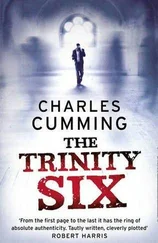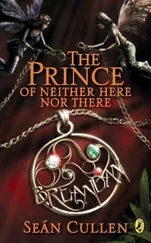Pat looked to Daniel for help.
Daniel shrugged. “What can I say? That’s the vision he had.”
“All right, be that way.” Pat turned to Trinity. “Can I assume that your vision doesn’t prohibit me coming along to help protect you?”
Trinity smiled, started to speak.
“No,” Daniel interrupted. “Pat, I didn’t ask you—”
“Fuck off, man,” said Pat. “I’d have been dead four years ago if not for you. So as long as it’s OK with the Amazing Kreskin over here, I’m in.”
After a few seconds Daniel said, “Fine. Thank you.”
“Don’t thank me.”

The bedside clock glowed 1:30. Tim Trinity still couldn’t sleep. Daniel’s snoring, while quiet by snoring standards, wasn’t helping any. And there was the anarchic symphony of frogs and crickets and God knows how many other nocturnal swamp critters, just outside the window screen. Trinity stood, tiptoed to the door, and slipped out into the hallway. Light from the kitchen spilled into the hallway, enough so he could make his way along, the smell of coffee getting stronger as he went.
Pat sat at the kitchen table. The mug in his hand bore a US NAVY SEALS crest. Spread on the table, a street map of the downtown New Orleans, red marker lines indicating routes in and out of the French Quarter. On top of the map, a John le Carré novel.
“Can’t sleep,” said Trinity. Pat gestured to the chair across, and he sat. “Got any bourbon?”
Pat shook his head. “I don’t drink.”
“Really?”
“Never touch it.”
“Now I have seen everything.” Trinity chuckled. “A tee-totaling mercenary. Amazing.”
Pat smiled. “If it helps my badass credentials, I do smoke a little reefer from time to time. Alcohol just doesn’t agree with me.” He stood and took his mug to the coffee maker. “Speaking of drugs, you want a cup? Or tea.”
“What the hell, I’ll take coffee, I’m not sleeping anyway,” said Trinity. “Black, one sugar.”
Pat filled a purple and gold LSU mug and handed it to Trinity as he sat.
Trinity sipped the coffee. It was strong and had chicory in it and tasted like home. “I’m guessing you don’t believe in all this,” he said. “I mean, that what’s happening to me is coming from God.”
“You’re assuming I even believe in God. I’ve been all around the world, and all I’ve seen are reasons not to believe. Still keeping an eye out for him, mind you. But...”
“I don’t know how you do it,” said Trinity. “I’m not judging, I just don’t understand. You kill people for a living. I can see how you could do that in service of a larger belief…but if you don’t believe in anything…”
“I’m not a nihilist,” said Pat. “I protect people for a living, and I kill anyone who makes an attempt on my clients. Sometimes the client is trying to change his government, other times the client is a government. Or there is no viable government, and I’m in the middle of a civil war. I don’t care which, so long as the client’s goal meets my criteria. Free and fair elections in a democracy limited by a constitution that caps the power of the state and protects dissent. That’s what I believe in.”
“That’s gotta limit your job opportunities.”
“It surely does,” said Pat with a smile. “But I’m very expensive, so I can be choosy.”
“And that’s it, that’s your criteria?”
“Hey, it’s the American ideal. I’ve been around enough to know we don’t live up to it, but it should always be our aim. See, I don’t need God to tell me about basic human rights. Reason does the job just fine.”
“Thin line between reason and rationalization,” said Trinity. “People step over it all the time.”
“True ’nuff,” said Pat. He sipped his coffee. “Look, man, I grew up in these swamps. Both my grandfathers were Cajun Catholics, one grandma was a Choctaw Indian, the other a half-black half-Indian who practiced a kind of swamp spiritualism somewhat akin to Hoodoo. They were all believers, and you know what belief did for them? It helped them accept their lot in life. Thing is, their lot in life was getting shit on by the ruling class. To me, that’s what religion is. A philosophy of coping. It may bring comfort to the dispossessed, but comfort isn’t good for the dispossessed. The dispossessed need to stay pissed off so things can change for the better.”
Trinity hadn’t intended to hit a nerve. He raised his hands in mock surrender and sent Pat a friendly smile. “Well, I haven’t been a believer very long myself. Preaching was always just a grift for me.”
Pat smiled back at him. “You and every other preacher on TV.”
“Can’t speak for all of them but, yeah, it’s an exceedingly profitable business,” said Trinity. “Anyway, Danny walked out on me barely in his teens…and I suppose I gave him every reason to.”
“You two seem to be gettin’ along OK.”
“It’s good to have him home,” Trinity said. “But I don’t want to rush things with him, you know?” He sipped some coffee.
“Ah, I get it. You want me to tell you about Honduras.”
Trinity nodded.
“Just remember,” said Pat, “there’s three sides to every story: yours, mine, and the truth. I can only give you mine.”
“I’d be much obliged.”
Pat sipped some coffee. As he spoke, his eyes became unfocused, looking back in time. “My client was an economics professor, running for the Honduran National Congress. An anti-corruption do-gooder campaigning on electoral reform.” He smiled. “My kind of guy. His popularity was growing fast, he was a threat to the status quo. He had supporters everywhere, and word leaked out to us that Battalion 3-16—that’s the CIA-trained Gestapo down there—was planning to cancel his ticket while he slept. I drove him up to a small mountain village where the local priest, Father Pedro, was a supporter. One of those political priests, you know, the liberation theology guys, but he wasn’t a Marxist like some of them. He just thought Jesus meant it when he instructed us to feed the hungry and care for the sick and visit the imprisoned. Anyway, Father Pedro was brave, he walked the walk, ya know? He hid us in the basement of his church as a couple jeeps pulled into town, six soldiers hopped out and started interrogating the locals. The padre told them we’d stopped to eat a meal, and then we’d left heading north. But somebody must’ve talked, ’cause they posted a few soldiers outside the church, front and back, round the clock.” He shook his head at the memory. “The longer we hid in that basement, the more frustrated the goon squad outside got, but there was no way to slip past them. The military in El Salvador had murdered a couple of political agitator priests, and it was easy to believe the practice might be spreading.”
From a dog bed on the floor, Edgar let out a melodramatic sigh.
“You said it, partner,” Pat said to the dog.
“I think I see how Daniel got involved,” nudged Trinity. “You couldn’t get out, so you figured to bring the world to you. Fastest way is to run a con. Some kind of fake miracle to get the world’s attention.”
“No flies on you,” said Pat. “Father Pedro put the word out, and one by one the village patriarchs came by, and he told them the plan. Next thing you know, old ladies and men are coming to church with various maladies.”
“Spontaneous healings! A classic,” said Trinity, “never gets old.”
Pat nodded. “They confess their sins to Father Pedro, tell him their ailments, and emerge from the confession booth babbling excitedly about how they felt electricity running through their bodies when Pedro forgave their sins. Their various maladies miraculously vanished. It got the Vatican’s attention all right. Within forty-eight hours, Daniel arrived to investigate.”
Читать дальше













